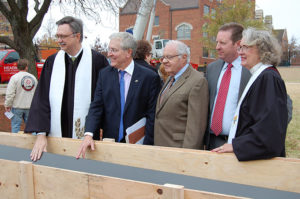A large part of President Robert Henry’s legacy is his interfaith work.
Henry will retire as the 17th university president effective June 30. Martha Burger will assume the role the following day.
During his time in office, Henry worked to promote interfaith dialogue and received several awards for his efforts. His awards include the Oklahoma Human Rights Award, the Myrtle Wreath Award for Humanitarianism from the Oklahoma City Chapter of Hadassah and the Oklahoma Israel Exchange Award.
Henry received the Lifetime Achievement Award from the Dialogue Institute of Oklahoma City in March 2017. The Dialogue Institute is an organization established by Turkish-Americans with the purpose of creating peace and harmony among people.
Henry said focusing on commonality is crucial to interfaith work.
“We are more alike than we are different,” Henry said. “Once you begin studying different faiths, you’ll find that people are after the same things in their faiths. They’re after comfort, understanding of who they are in the world, why they are here, and the desire to understand life and understand about death.”

President Robert Henry helps Wimberly School of Religion officials host a dedication service for a new spire before its installation on Bishop W. Angie Smith Chapel in 2011. The chapel’s original spire broke off during a windstorm in 2008.
In an interview preceding his acceptance of the Dialogue Institute award, Henry said his most meaningful interfaith experience was with the “Say No to Hate” campaign, which he helped start in the late 1980s after Aryan supremacists desecrated a Jewish synagogue in Silver Spring, Maryland by painting “take a shower, Jew” on it.
“It still horrifies me to recall that,” Henry said.
Henry represented the United States Judiciary at the Arab Judicial Forum, and he served on the Council on Foreign Relations and on the board of directors for Foundation for the Future in Amman, Jordan.
Henry said he’s proud of OCU officials for their close relations with the interfaith community and their willingness to let rabbis teach.
“We’ve made our campus open to people of goodwill,” he said.
Henry created the Islamic studies program in 2009 and chose the Imam Dr. Imad Enchassi to be in charge of it.
“Whenever any religious group is victimized by some bad thing that happens, everyone on this campus comes to help, and, particularly now in the United States, our Muslim brothers and sisters have experienced a lot of discrimination,” Henry said.
Enchassi said he appreciates that Henry is present during interfaith conversations.
“His commitment is very refreshing, considering the political atmosphere,” he said. “His approach to interfaith dialogue is not only needed for us to live in a tolerant society, but also to achieve peace.”
There is an Interfaith Prayer Room in Kramer School of Nursing, open 24 hours a day to all students. There is also an opportunity for an interfaith studies minor, and students can get involved with events like “Better Together Day,” which was this week. The day celebrates different religions and world views with love, not hate.
Addison Saviers, religion freshman, is pursuing an interfaith studies minor. She said a big part of her college decision was related to interfaith dialogue.
“As members of the human race in the human family, it’s important to know about each other, our cultures, our faiths, our beliefs, to make it easier to live with each other,” Saviers said. “There’s no reason anyone should stay in their little bubble of people and not explore.”
Saviers said the Wimberly School of Religion recently came up with an accommodation policy stating that students can be absent for religious holidays, even flying back home to celebrate with family. She also said people don’t have to be religious to be a part of interfaith conversations and said it’s actually very helpful for atheists and agnostic people to learn about more religions.
“That’s what I love about the interfaith minor,” she said. “You don’t have to be religious to be a part of that minor.”
Henry said he will continue to speak at churches and interfaith events after his retirement.


Leave a Reply